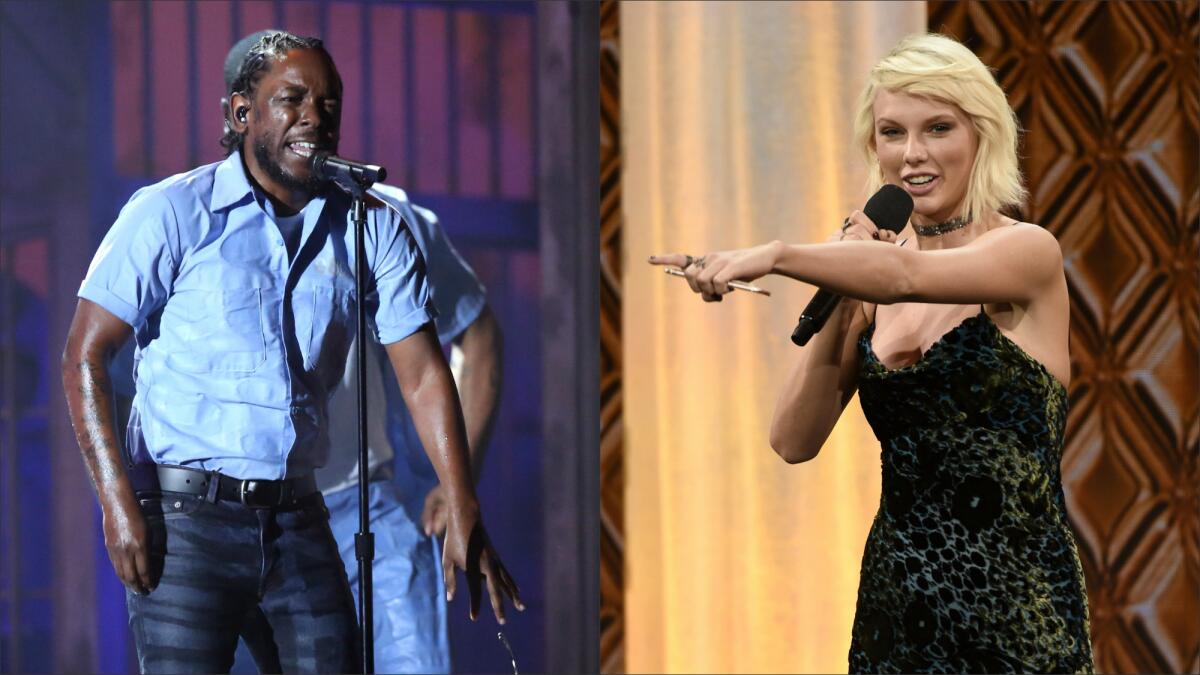Popular music and the loss of anger

- Share via
When Beyoncé released her album “Lemonade” earlier this year, it took America by surprise, and not because she dropped it unexpectedly on a Saturday evening, or that it fueled speculation that her marriage was in trouble.
The singer’s newest work stood out because it was unapologetically angry.
Though popular music has historically served as a barometer of youth culture’s discontent, and almost every meaningful evolution in pop, rock and hip-hop has come from a place of disillusionment or outrage, pop music is now one of the few areas in American culture where anger is in short supply.
EDM, celebratory club music that’s often lyric-free, has hands-down been the biggest draw at music festivals over the last few years. The top rapper in the country, Drake, is a docile Canadian. And if you’re R&B’s the Weeknd (also Canadian), introspection means recounting all the ways in which you feel worthless for partying too hard the night before.
While pop has managed to celebrate as the rest of the world burns, television and film have increasingly channeled the ire of a shrinking middle class (“Breaking Bad,” any given Trump or Sanders rally), institutional racism (“Selma,” “Fruitvale Station”) and the numbness caused by bad news overload (“Mr. Robot,” “Unbreakable Kimmy Schmidt”).
“Every single era has had escapist music: In the 1950s, there was the pop that came after Little Richard,” says Billie Joe Armstrong, singer and songwriter of Green Day, arguably the last major rock band to turn fury and indignation into a top 10 album with 2004’s “American Idiot.”
Music goes through these cycles, but this happens to be the longest cycle I remember without someone breaking through on a meaningful level.
— Billie Joe Armstrong of Green Day
“After the turbulent ’60s, you got ’70s schlock -- quiet and boring [music], lots of earth tones -- then punk came around. Music goes through these cycles, but this happens to be the longest cycle I remember without someone breaking through on a meaningful level; someone who really has something to say.”
There are some small signs that music is waking from its stupor.
Beyoncé’s rage about being deceived, rapper Kendrick Lamar’s artful commentary on inequality and other notable releases by artists such as Kanye West and Rihannah have expressed outrage and dismay in ways that challenge the passivity of their peers.
The Black Lives Matter movement has propelled stars like Snoop and Drake to express their anger at protests and on social media. Jay Z and Miguel recently released their own tracks about unarmed black men being killed by police.
But it’s all a proverbial drop in the bucket, given that anger – from the fury of talking heads on Fox News and CNN to heated congressional sit-ins over gun control -- is now a common currency in American discourse.
There is plenty of music out there with a healthy sense of moral outrage, but it isn’t trending on iTunes or Spotify. It’s underneath a billion other choices competing for your attention, bumping up against popular tastes, waiting for the shift that will upend music’s current stalemate.
Traditionally, pop music has been the most nimble medium when it comes to reflecting the national mood, simply because making an album or single is quicker and less expensive than producing a film or TV show. But as free streaming services, YouTube and the like continue to deplete record industry revenue, major labels are less inclined to take risks on music that might alienate its young base.
“The reason we think of popular music as being more revolutionary in previous decades is because now, pop is aimed at a younger audience than it was,” says the Boston Conservatory at Berklee’s Joe Bennett, a forensic musicologist who analyzes popular music. “There was always [bubblegum pop] for younger fans, but there was lots of other stuff too, like rock, that tended to appeal to an older audience. That’s an audience who may have burgeoning political sensibilities and antiwar sentiments.”
The target music consumer of today is a millennial born between 1983 and 2003. Millennials are the largest generation in U.S. history, taking over that distinction from their boomer parents. They’re also an optimistic group that appears to have nothing in common with the angsty Gen-Xers who came before them.
“The visible manifestation of anger, just getting mad at someone, plays out differently in different age brackets,” says Neil Howe, author of “Millennials Rising” and a sociologist who specializes in generational changes.
“Millennials find that angry punditry on Fox or MSNBC is an old person’s thing,” Howe says. “They are more trusting of the system, they’re more optimistic about the future, and they believe strongly in community. That’s why they like EDM -- you enjoy it in a group, and that’s totally in sync generationally. It’s also totally happy and escapist. Millennials aren’t interested in introspecting and devising new social movements through music. Music is just fun to them and not much more.”
The passionate songs that have gained traction with millennials, such as Taylor Swift’s “We Are Never Ever Getting Back Together,” come from a more tempered place than say, Alanis Morissette’s 1995 smash hit “You Oughta Know” or the Who’s 1971 track “Baba O’Riley.”
“Angry songs are now nearly all enraged breakup songs. Which speaks much more to individualism than societal indignation as rage.
— Joe Bennett, forensic musicologist at the Boston Conservatory at Berklee
“Angry songs are now nearly all enraged breakup songs,” says Bennett. “Why did you dump me? Which speaks much more to individualism than societal indignation as rage.”
Since every new generation strives to set itself apart from the one that came before, there is an argument that the relative silence is millennials’ reaction to the anger engulfing our nation.
“Ignoring it, that’s their statement,” says Armstrong, whose kids are now 18 and 21. “That’s their anger. You’re making me angry, so I’m turning my back on you. They’re done dealing with it all. They’re like, ‘I’m going to binge-watch zombies eating each other.’ ”
Top-grossing musical genres have also evolved recently in kinder and gentler ways -- confrontational styles such as punk, gangsta rap, metal and grunge have given way to a proliferation of teen sensations and party-friendly hip-hop.
“It’s not usually the case that songwriters write to the market, but the market does decide what it wants to buy,” says Bennett. “In that regard, pop music fans are going to gravitate toward what they feel and what they’re thinking about at that time. Pop is merely reflecting the moods of their time, rather than steering it, and that mood will change.”
Adds Armstrong, “It’s come to the point where artists are backed into a corner where there’s really no other place for them to go. You look at what’s happening with the news, and everything that’s going on in the world, and it’s kind of like ‘The Walking Dead.’ it’s coming right at you. You better write something about it.”
MORE:
On TV, rage has become the new romance
The biggest entertainment stories
Get our big stories about Hollywood, film, television, music, arts, culture and more right in your inbox as soon as they publish.
You may occasionally receive promotional content from the Los Angeles Times.








